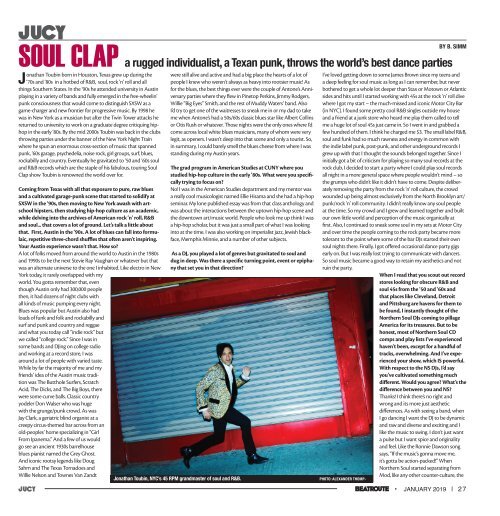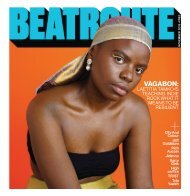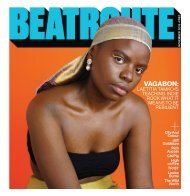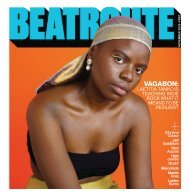You also want an ePaper? Increase the reach of your titles
YUMPU automatically turns print PDFs into web optimized ePapers that Google loves.
JUCY<br />
BY B. SIMM<br />
SOUL CLAP a rugged individualist, a Texan punk, throws the world’s best dance parties<br />
Jonathan Toubin born in Houston, Texas grew up during the<br />
‘70s and ‘80s in a hotbed of R&B, soul, rock ‘n’ roll and all<br />
things Southern States. In the ‘90s he attended university in Austin<br />
playing in a variety of bands and fully emerged in the free-wheelin’<br />
punk consciousness that would come to distinguish SXSW as a<br />
game-charger and new frontier for progressive music. By 1998 he<br />
was in New York as a musician but after the Twin Tower attacks he<br />
returned to university to work on a graduate degree critiquing hiphop<br />
in the early ‘80s. By the mid 2000s Toubin was back in the clubs<br />
throwing parties under the banner of the New York Night Train<br />
where he spun an enormous cross-section of music that spanned<br />
punk, ‘60s garage, psychedelia, noise rock, girl groups, surf, blues,<br />
rockabilly and country. Eventually he gravitated to ‘50 and ‘60s soul<br />
and R&B records which are the staple of his fabulous, touring Soul<br />
Clap show Toubin is renowned the world over for.<br />
Coming from Texas with all that exposure to pure, raw blues<br />
and a cultivated garage-punk scene that started to solidify at<br />
SXSW in the ‘90s, then moving to New York awash with artschool<br />
hipsters, then studying hip-hop culture as an academic,<br />
while delving into the archives of American rock ‘n’ roll, R&B<br />
and soul... that covers a lot of ground. Let’s talk a little about<br />
that. First, Austin in the ‘90s. A lot of blues can fall into formulaic,<br />
repetitive three-chord shuffles that often aren’t inspiring.<br />
Your Austin experience wasn’t that. How so?<br />
A lot of folks moved from around the world to Austin in the 1980s<br />
and 1990s to be the next Stevie Ray Vaughan or whatever but that<br />
was an alternate universe to the one I inhabited. Like electro in New<br />
York today, it rarely overlapped with my<br />
world. You gotta remember that, even<br />
though Austin only had 300,000 people<br />
then, it had dozens of night clubs with<br />
all kinds of music pumping every night.<br />
Blues was popular but Austin also had<br />
loads of funk and folk and rockabilly and<br />
surf and punk and country and reggae<br />
and what you today call “indie rock” but<br />
we called “college rock.” Since I was in<br />
some bands and DJing on college radio<br />
and working at a record store, I was<br />
around a lot of people with varied taste.<br />
While by far the majority of me and my<br />
friends’ idea of the Austin music tradition<br />
was The Butthole Surfers, Scratch<br />
Acid, The Dicks, and The Big Boys, there<br />
were some curve balls. Classic country<br />
yodeler Don Walser who was huge<br />
with the grunge/punk crowd. As was<br />
Jay Clark, a geriatric blind organist at a<br />
creepy circus-themed bar across from an<br />
old-peoples’ home specializing in “Girl<br />
From Ipanema.” And a few of us would<br />
go see an ancient 1930s barrelhouse<br />
blues pianist named the Grey Ghost.<br />
And iconic rootsy legends like Doug<br />
Sahm and The Texas Tornadoes and<br />
Willie Nelson and Townes Van Zandt<br />
were still alive and active and had a big place the hearts of a lot of<br />
people I knew who weren’t always as heavy into rootsier music! As<br />
for the blues, the best things ever were the couple of Antone’s Anniversary<br />
parties where they flew in Pinetop Perkins, Jimmy Rodgers,<br />
Willie “Big Eyes” Smith, and the rest of Muddy Waters’ band. Also<br />
I’d try to get one of the waitresses to sneak me in or my dad to take<br />
me when Antone’s had a 50s/60s classic blues star like Albert Collins<br />
or Otis Rush or whatever. Those nights were the only ones where I’d<br />
come across local white blues musicians, many of whom were very<br />
legit, as openers. I wasn’t deep into that scene and only a tourist. So,<br />
in summary, I could barely smell the blues cheese from where I was<br />
standing during my Austin years.<br />
The grad program in American Studies at CUNY where you<br />
studied hip-hop culture in the early ‘80s. What were you specifically<br />
trying to focus on?<br />
No! I was in the American Studies department and my mentor was<br />
a really cool musicologist named Ellie Hisama and she had a hip-hop<br />
seminar. My lone published essay was from that class anthology and<br />
was about the interactions between the uptown hip-hop scene and<br />
the downtown art/music world. People who look me up think I was<br />
a hip-hop scholar, but it was just a small part of what I was looking<br />
into at the time. I was also working on imperialist jazz, Jewish blackface,<br />
Memphis Minnie, and a number of other subjects.<br />
As a DJ, you played a lot of genres but gravitated to soul and<br />
dug in deep. Was there a specific turning point, event or epiphany<br />
that set you in that direction?<br />
Jonathan Toubin, NYC’s 45 RPM grandmaster of soul and R&B.<br />
I’ve loved getting down to some James Brown since my teens and<br />
a deep feeling for soul music as long as I can remember, but never<br />
bothered to get a whole lot deeper than Stax or Motown or Atlantic<br />
sides and hits until I started working with 45s at the rock ‘n’ roll dive<br />
where I got my start – the much-missed and iconic Motor City Bar<br />
(in NYC). I found some pretty cool R&B singles outside my house<br />
and a friend at a junk store who heard me play them called to tell<br />
me a huge lot of soul 45s just came in. So I went in and grabbed a<br />
few hundred of them. I think he charged me $3. The small label R&B,<br />
soul and funk had so much rawness and energy in common with<br />
the indie label punk, post-punk, and other underground records I<br />
grew up with that I thought the sounds belonged together. Since I<br />
initially got a bit of criticism for playing so many soul records at the<br />
rock club, I decided to start a party where I could play soul records<br />
all night in a more general space where people wouldn’t mind – so<br />
the grumps who didn’t like it didn’t have to come. Despite deliberately<br />
removing the party from the rock ‘n’ roll culture, the crowd<br />
wounded up being almost exclusively from the North Brooklyn art/<br />
punk/rock ’n’ roll community. I didn’t really know any soul people<br />
at the time. So my crowd and I grew and learned together and built<br />
our own little world and perception of the music organically at<br />
first. Also, I continued to sneak some soul in my sets at Motor City<br />
and over time the people coming to the rock party became more<br />
tolerant to the point where some of the bar DJs started their own<br />
soul nights there. Finally, I got offered occasional dance party gigs<br />
early on. But I was really lost trying to communicate with dancers.<br />
So soul music became a good way to retain my aesthetics and not<br />
ruin the party.<br />
When I read that you scout out record<br />
stores looking for obscure R&B and<br />
soul 45s from the ‘50 and ‘60s and<br />
that places like Cleveland, Detroit<br />
and Pittsburg are havens for them to<br />
be found, I instantly thought of the<br />
Northern Soul DJs coming to pillage<br />
America for its treasures. But to be<br />
honest, most of Northern Soul CD<br />
comps and play lists I’ve experienced<br />
haven’t been, except for a handful of<br />
tracks, overwhelming. And I’ve experienced<br />
your show, which IS powerful.<br />
With respect to the NS DJs, I’d say<br />
you’ve cultivated something much<br />
different. Would you agree? What’s the<br />
difference between you and NS?<br />
Thanks! I think there’s no right and<br />
wrong and its more just aesthetic<br />
differences. As with seeing a band, when<br />
I go dancing I want the DJ to be dynamic<br />
and raw and diverse and exciting and I<br />
like the music to swing. I don’t just want<br />
a pulse but I want spice and originality<br />
and feel. Like the Ronnie Dawson song<br />
says, “If the music’s gonna move me,<br />
it’s gotta be action-packed!” When<br />
Northern Soul started separating from<br />
Mod, like any other counter-culture, the<br />
PHOTO: ALEXANDER THOMP-<br />
JUCY <strong>BEATROUTE</strong> • <strong>JANUARY</strong> <strong>2019</strong> | 27


















